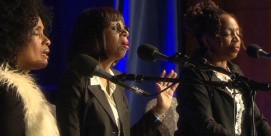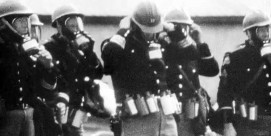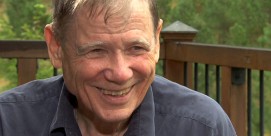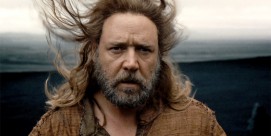AVA DUVERNAY, director: Well my entry point for the film was really my father. I am my father’s daughter and he was a man from Lowndes County, Alabama. And Lowndes County is the space that sits between Selma and Montgomery. It’s the backwoods, the farmlands that the protestors marched through when they went from Selma to Montgomery. The film is called Selma, not King, it’s really about the power of people. The people in this small town who changed the nation.
DAVID OYELOWO, actor: My entry point was Dr. King’s faith, you know I share his faith as a Christian myself. It’s one thing to talk about being a Christian and what that means and another to live it and walk it out.
The Rev. Martin Luther King Jr.: Those that have gone before say no more!
Crowd: No more!
The Rev. Martin Luther King Jr.: No more!
That’s what I admire so much about him is that sacrificial love is one of the tenets of being a Christian and he walked that in his private and his public life and did it literally to the point of sacrificing himself for humanity, not just for black people. That made those shoes less intimidating to fill. I am a father of four myself, like I say, I share his faith. I share the fact that he is a flawed human being, the fact that he had insecurities, he had doubts. He had incredible transcendent things about him as well and I feel like those were my, that was my way into him in a sense. I was less interested in perpetuating the myth of him being a great man, a great orator and more about who he was as a human being. Some people can think of non-violence as weak as in some ways on the verge of even retreat, but what I think we tried to show in this film and what was the case was it’s a weapon.
The Rev. Martin Luther King Jr.: That means protest. That means march. That means disturb the peace.
OYELOWO: To reveal the nation how serious this problem was to have the perpetrators of injustice to look themselves in the mirror is far more effective than blow for blow. At the end of the day they were always going to be outgunned. They were preachers, they were teachers, they were housekeepers. To go into a civil war would have been counterproductive because it would have taken place within their own communities and what would be left smoldering are their own homes, their own businesses, their own churches. That’s not effective. In the Selma campaign you truly see that. Now, it weighed heavily on Dr. King, the fact that the methodology was we are going to be non-violent in the face of your violence because what weighed on him was knowing that people would be hurt, people would be killed, that happened in Selma, but the byproduct was outrage. The question we have now is that we have become so anesthetized to violence and seeing hideous things take place on television screens and through the press that we need new answers, we need new strategies, we need something that expands the notion of nonviolence in this day and age, but certainly Dr. King and that movement typified how effective it could and should be. Andrew Young who was a right hand man to Dr. King would say he would never do anything until he had prayed about it first. We show that on turnaround Tuesday on the bridge, a raft of humanity behind him, he sees an obstacle before him, he makes the choice singularly to get on his knees, pray, and make a decision that surprised everyone who was there with him. I would argue that it was the right decision considering what he was up against, a very difficult decision and I think as a result, he was far more effective because he wasn’t operating out of ego, out of a knee-jerk reaction, everything was considered and he was often being led from beyond the four corners of his own mind.
DUVERNAY: I think David and I were really interested in not making a movie about a statue, a speech, or a holiday or a street or a catch-phrase, we were interested in getting underneath a great man, and really understanding who he was as a human being. David always says, and I think it’s great when he says it, it does something to me as a film lover, that people go to the movies to see themselves and so how do you see yourself about a film about Dr. Martin Luther King? He is such an icon. But that was our goal, that was our charge to humanize him. I think in doing that, to demystify, deconstruct your heroes, you get underneath them you see they are really just like you, they are ordinary people who did extraordinary things so that was our goal. We read everything, we talked to everyone we could, we listened to everything and then we just let our imaginations delve into the places that are not outlined in the history books, what is underneath, what is in between the lines? And we tried to bring some human complexity to the facts on a timeline.
OYELOWO: Even though Dr. King was cut down before he got to see his dream realized and we are by no means in America where his dream had been realized, there are reverberations from what he did, the intentions of what he and that movement did that we are beneficiaries of, and that love continues to reverberate out.
The Rev. Martin Luther King Jr.: If you believe all are created equal come to Selma. Join us, join our march against injustice and inhumanity.
OYELOWO: We made this film in a certain spirit of love and service, to see that effecting an audience, for them to receive it in the spirit in which it was made, is just undeniable to me experientially having gone through this and that’s a wonderful thing to witness.







